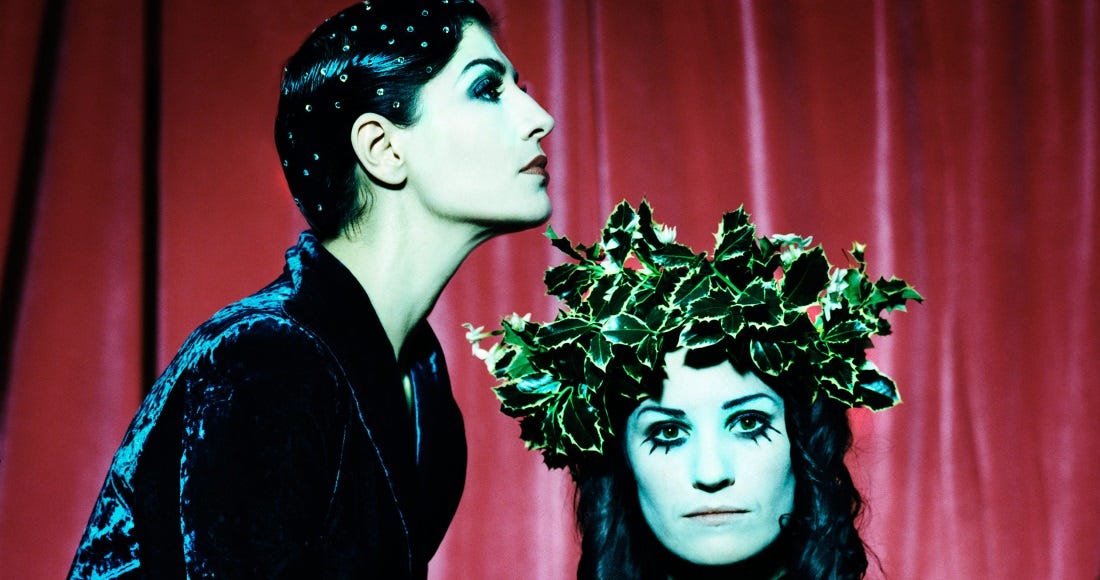"Stay"- Shakespears Sister
Today’s issue is a guest post by the talented Mark Blankenship at The Lost Songs Project. Mark examines and celebrates the underrated hits from our favorite artists. I hope you’ll subscribe to The Lost Songs Project and rediscover some pop treasures.
“Stay” doesn’t sound like a hit record. It sounds incredible, but it doesn’t sound like anything else that was on the radio in 1992. Conventional wisdom says mainstream audiences don’t have an ear for songs this strange.
For one thing, Marcella Detroit, who delivers the lead vocal, sings like she’s gazing mournfully across a moor. There’s a vulnerability in her performance — a tremulous, devastated quality — that almost makes her sound like she’s revealing too much. Nobody who’s worried about decorum is going to sound like this — like she’s actually crying when she hits high notes.
Or at least that’s how she sounds before the song’s climax. At that point, she goes into a full-on shriek. You could call what she hits a whistle note, but this isn’t Mariah Carey punctuating a hip-hop break. This is frenzy. It’s hard to think of another major pop hit that even aims for this kind of emotion. You can find it on contemporary songs by Tori Amos or Bjork, but they weren’t scaling the singles charts alongside Sir Mix-a-Lot’s ode to the juicy bubble.
And that’s just Marcella Detroit’s portion of the duet. There have been plenty of popular duets, but very rarely does the second singer embody the voice of a malevolent spirit. When Siobhan Fahey (founder of Shakespears Sister and former member of Bananarama) enters at the bridge, her voice is as smoky and deep as Detroit’s is plaintive and high. “When you sleep at night,” she croons, “they don’t hear your cries back in your own world.” And if that’s not eerie enough, she reminds Detroit’s character that only time will decide if this emotional spell she’s under will be broken. Maybe she’ll will return to the regular world that’s free of things like obsession and longing and pain, but maybe she won’t.
This is like something from an Edgar Allen Poe poem, having a narrator drop in to sow seeds of doubt and despair. And keep in mind: It’s only after Fahey’s section that Detroit goes into the banshee wail. Does Fahey embody the voice of Detroit’s inner doubt? Maybe, or maybe she really is just a demon of some kind, talking about the worst of love.
No matter how we interpret the lyrics, the music makes sure we understand the operatic stakes. Fahey and Detroit co-wrote “Stay” with Dave Stewart. (That’s Dave Stewart from the Eurythmics. He was also Fahey’s husband at the time.) Together, the trio delivers a spare, haunting soundscape that evolves into a thundering, menacing dirge. Those drums and guitars under Fahey’s voice are sludgy and spooky, and once they arrive, they remain for the rest of the track. But there’s also a beautiful, echoing piano figure that adds elegance to the proceedings. If you listen, you’ll even hear the occasional shimmer of chimes. It’s emotionally grand in a way that only Jim Steinman was attempting at the time.
But Steinman’s songs, for all their glorious excess, are always straightforward. Meat Loaf and Celine Dion and Bonnie Tyler sing his tunes like they're the absolute gospel truth. Fahey’s dark verse in “Stay” adds a wry, winking twist to the whole affair. To use the modern parlance, her chaotic energy comments on and even mocks Detroit’s pain. That’s some campy business, and it keeps us from simply crying our eyes out. It forces us to hear “Stay” as an ironic statement about romantic balladry.
All of this is captured in the music video. It casts Detroit as a distraught lover in white face paint, trying to keep her man from dying in a hospital bed. She’s begging him to stay with her in the land of the living. And then Fahey arrives dressed like a glittery Shakespearean witch, mugging and sneering as she tries to drag this dude to hell. The campiness is as bare as the comatose guy’s chest.
When I first saw this clip, I was 13 years old and just beginning to understand that I was gay. And while I didn’t yet understand that my queerness included a deep attraction to larger-than-life performances of feminine power, I definitely understood that I wanted to see “Stay” again. I was enraptured by the song the way one gets enraptured by things at that age. I bought the cassette single and then the Shakespears Sister album Hormonally Yours. I listened to that album over and over that summer. It felt like my secret passion.
But it wasn’t my secret. I watched with amazement as “Stay” climbed Billboard’s Hot 100. When it peaked at #4, I felt personally validated somehow. It was like my own burgeoning sensibilities had been embraced.
Even now, “Stay” sounds distinctly wild and excessive, and I suspect that’s helped it linger in the culture. When the try-hard theater girls on a 2022 episode of Derry Girls staged a number for a talent show, they naturally dressed up as Shakespears Sister. When Cher Lloyd performed “Stay” on The X-Factor in 2010, it sent the song back into the British Top 20. Even better, Shakespears Sister themselves have carried on, reuniting in 2019 after an acrimonious split kept them apart for decades. Friends becoming enemies becoming friends: It’s a storyline dramatic enough for the band that made heightened drama sound so glorious.
Did you catch last week’s issue?






Thank you so much for having me, Jami! I loved writing this.
YES! Thanks for this, Mark! I had that damn cassette single, too. And listened to Stay and the Trouble with Andre a million times. I went in search of "this kind of music" throughout my teen years until in my college days (late-90s) I discovered Miranda Sex Garden.